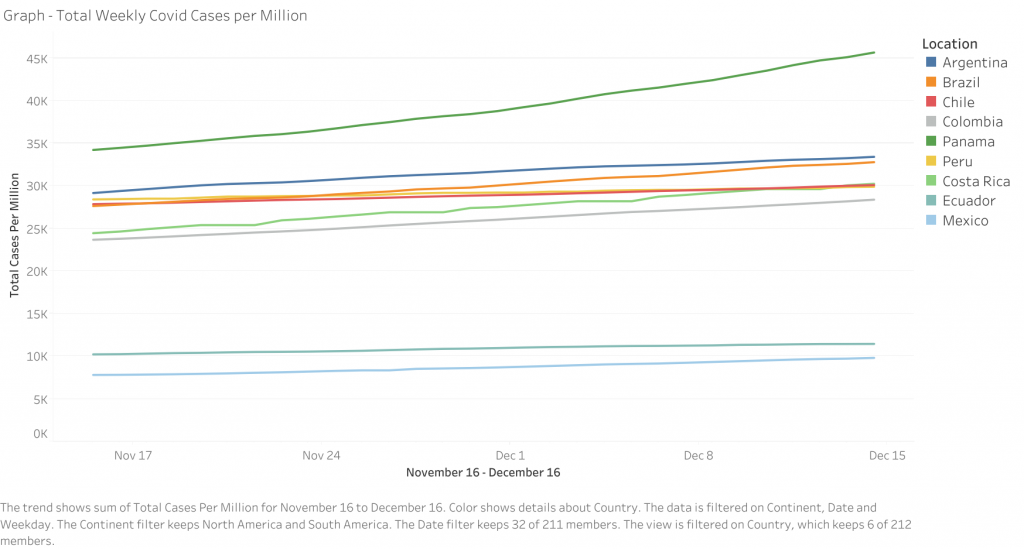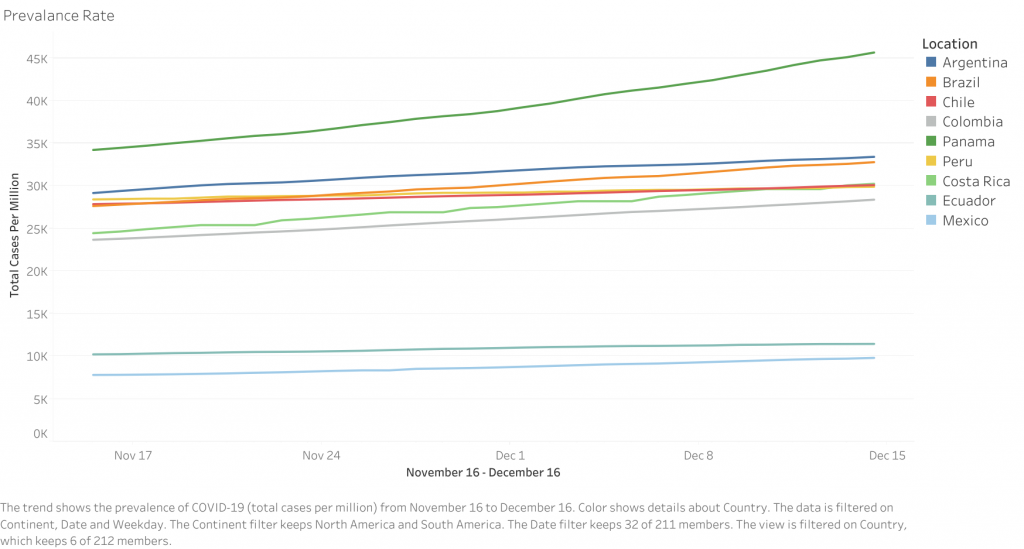What you should know
- Vaccines in Latin America: After becoming the first Latin American country to approve a COVID-19 vaccine, Mexico will begin inoculations of the Pfizer vaccine on December 22. The country is expecting 125,000 doses from Pfizer in the next few days, which will be received and deployed by the country’s Armed Forces. Panama, Costa Rica, Ecuador, and Chile have all authorized emergency use of the vaccine.
- $20 billion: U.S. Senator Marco Rubio (R-FL) joined Senator Bob Menendez (D-NJ) in introducing new legislation authorizing the tenth general capital increase for the Inter-American Development Bank (IDB). The legislation would increase the IDB’s annual lending by $20 billion.
- 2.7 million: At least this number of businesses – most of them small and medium-sized enterprises (SMEs) – are expected to shut down in Latin America as a result of the COVID-19 pandemic.
- One in four: The Mexican government estimates one in four Mexicans (31 million people) have contracted COVID-19.
- 29 million: With this number of cases (43 percent of the world’s total) and more than 760,000 deaths (49 percent of the world’s total), the Americas is now experiencing the highest levels of daily COVID-19 cases since the start of the pandemic. Here are this week’s figures.
Quarantine + reopening plans
Countries across the region are taking measures to avoid crowds during the holiday season.
- On December 16, Cali, Colombia re-imposed strict containment measures including limiting in-person shopping by identification number. Nationally, the Ministry of Health restricted alcohol sales in cities with less than 30 percent ICU availability.
- Panama announced weekend quarantines in December and closed most public spaces, including beaches. A 7:00pm daily curfew and increased restrictions on alcohol sales will take effect on December 18.
- In Río de Janeiro, Brazil, officials canceled the traditional New Year’s beach party to prevent crowds from gathering.
- On December 14, Paraguay announced new measures to curb the spread of COVID-19 including the obligatory use of masks and greater fines for disregarding containment measures. The government warned that it would close businesses that fail to comply.
International travel restrictions
- Venezuela announced it will no longer permit flights to and from Panama because of Panama’s increasing COVID-19 cases. Venezuela will still allow flights to Mexico, Turkey, and Bolivia.
- On December 15, Peru resumed flights between Lima and Europe. Passengers will be permitted to fly to Amsterdam, Madrid, Barcelona, Paris, and London.
Economies in focus
Economic Impact
- In 2020, retail e-commerce sales are expected to grow 37 percent in Latin America, making the region the fastest-growing e-commerce market in the world.
- 62 percent of IMF loans issued in response to the pandemic were awarded to 21 Latin American countries.
- Fitch upgraded Suriname’s long-term foreign-currency default rating after creditors agreed to postpone a debt payment due in October to this upcoming March.
- Fitch also downgraded Peru’s economic outlook from stable to negative but maintained the country’s BBB+ rating.
- The Economic Commission for Latin America and the Caribbean improved its predictions for the region, forecasting the region’s GDP will grow 4 percent in 2021.
Economic Aid
- The United Kingdom and Mexico signed a trade deal on December 14, focused on the automotive, pharmaceutical, textile, agriculture, and food and beverage industries.
- Brazil’s income transfer program, offered to a third of the country’s population as part of the government’s response to the crisis, will end on December 31. Economy Minister Paulo Guedes said the government is seeking alternatives to the program that do not contribute to the fiscal deficit, such as welfare benefits.
- The World Bank approved a loan of $300 million to strengthen Panama’s health and economic response to the pandemic.
- The IDB approved a $20 million loan to reduce the morbidity and mortality of COVID-19 in the Bahamas and to mitigate the indirect impacts of the pandemic on health.
- The IDB also issued a loan of $38.4 million to the Brazilian state Paraiba to support the state’s fiscal sustainability.
- The IMF approved a loan of $90 million to Honduras for the country’s COVID-19 response as part of the country’s stand-by arrangement.
Resilience, recovery + renewal
New Episode: How Green is Green? The Growth of Sustainable Investment Products
As companies look to build resilience and recovery in the aftermath of the pandemic, the focus on Environmental Social and Governance (ESG) has accelerated on a global scale. How is the growth of green investment products taking shape?
In the newest episode of Baker McKenzie’s Resilience, Recovery and Renewal podcast series, experts will take a closer look at the state of sustainable finance and what is working around the globe.
Guests: Paul Stanley (Senior Manager, Corporate Sustainability, HSBC) and from Baker McKenzie Adam Farlow (Head of ESG Debt and Equity), Caitlin McErlane (Partner) and Andrew Sagor (Head of Responsible Investment)
Subscribe to the 3R podcast series: Apple Podcasts | Spotify | Google Podcasts
Health + innovation
- On December 16, Ecuador and Chile approved the emergency use of the Pfizer-BioNTech COVID-19 vaccine.
- On December 15, Panama approved the emergency use of the Pfizer-BioNTech COVID-19 vaccine. The country bought 3 million doses from Pfizer and expects to receive them in the first quarter of 2021. Panama also has a supply agreement for over a million doses with AstraZeneca’s COVID-19 vaccine.
- Also on December 15, Costa Rica authorized emergency use of the Pfizer-BioNTech COVID-19 vaccine.
- On December 14, PAHO adopted a Readiness Assessment Tool to guide member countries’ preparations for COVID-19 vaccine roll-out. The tool includes health workers’ engagement, regulatory mechanisms, communications and training, and logistics including cold chain and supply chains.
- On December 14, the US Food and Drug Administration (FDA) announced the Moderna vaccine was “safe and highly effective.” An outside panel of experts will give a recommendation on the emergency authorization of the vaccine on December 17, after which the FDA will give its final decision.
- On December 13, Peru suspended trials of China’s Sinopharm vaccine after a participant had a serious adverse reaction. While the case remains under investigation, supply negotiations between the Peruvian government and Sinopharm are underway. Peru also resumed negotiations with AstraZeneca after suspending talks in October.
- The Mexican government’s medical safety commission approved the emergency use of the Pfizer-BioNTech COVID-19 vaccine on December 11. Vaccinations are expected to begin this month. Front-line health workers will get the shots first.
- Also on December 11, the FDA authorized Pfizer’s COVID-19 vaccine for emergency use. The first Pfzier vaccine was administered in the United States on December 14. Pfizer has an agreement with the U.S. government to supply 100 million doses of the vaccine by next March.
In Focus: US President-elect Joe Biden and Latin America
- After the Electoral College certified President-elect Joe Biden as the winner of the US presidential election, Brazil’s Bolsonaro and Mexico’s López Obrador have congratulated President-elect Joe Biden six weeks after the vote. “Greetings to President Joe Biden, with my best wishes and the hope that the United States will remain ‘the land of the free and the brave,’” Bolsonaro said on Twitter. “We are certain that, with you as president of the United States, it will be possible to continue applying the basic principles of foreign policy contained in the (Mexican) constitution, especially non-intervention and the right to self-determination,” López Obrador’s letter read.
- The Biden-Harris administration will face urgent challenges in the region, where the public health and economic crises are compounding preexisting pressure on democratic institutions and exacerbating inequalities. “The Western Hemisphere has the potential to be secure, democratic, and prosperous from the northern reaches of Canada all the way to the southern tip of Chile,” reads President Elect Joe Biden’s Central America plan.
- Senator Tim Kaine (D-VA) outlined a 7-point plan regarding President-elect Joe Biden’s possible foreign policy toward Latin America and the Caribbean. “The Summit of the Americas will be hosted by the United States next year. What an opportunity this could be for Biden if he took time in his first nine months as president to deliver an ‘all Americas’ foreign policy. Indeed, his inauguration would not just be seen as a turning point for our country but as a turning point for the Western Hemisphere as a whole.”
- NEW REPORT: A key priority for the next US administration will be working alongside partners and allies in the Western Hemisphere to assure supply-chain resilience is achieved and prioritized. Our Center’s publication, in collaboration with Baker McKenzie, looks at how cooperation across the Western Hemisphere can position suppliers to withstand future shocks while setting the stage for the modernization and increased resilience of supply chains in the medium to long term.
By the numbers
- Cases by country: Brazil (6,985,555) # 3 worldwide, Argentina (1,510,203) #10 worldwide, Colombia (1,444,646) #11 worldwide, Mexico (1,267,2020) #13 worldwide, Peru (987,675) #16 worldwide, Chile (576,731) #24 worldwide, Ecuador (202,356) #41 worldwide, Panama (196,987) #43 worldwide, Dominican Republic (156,585) #50 worldwide, Costa Rica (154,096) #51 worldwide, Source: worldometers.info
- Prevalence rate (total cases per million people): Aruba (47,479) #14 worldwide, Panama (45,330) #16 worldwide, Argentina (33,397) #32 worldwide, Brazil (32,757) #33 worldwide, Costa Rica (30,124) #39 worldwide, Chile (30,052) #40 worldwide, Peru (29,766) #43 worldwide, Colombia (28,254) #45 worldwide, Saint Martin (20,557) #61 worldwide, The Bahamas (19,491) #65 worldwide, Source: worldometers.info
- Deaths per capita (deaths per million people): Peru (1,110) #3 worldwide, Argentina (908) #14 worldwide, Mexico (888) #16 worldwide, Brazil (858) #19 worldwide, Chile (832) #20 worldwide, Panama (785) #21 worldwide, Ecuador (782) #22 worldwide, Colombia (770) #24 worldwide, Belize (526) #39 worldwide, Aruba (430) #41 worldwide, Source: worldometers.info
Quick take


Sponsored By

